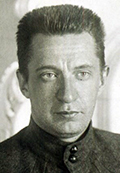 |
Aleksandr Fedorovič Kerenskij (Александр Федорович Керенский)
b. 22 Apr/4 May 1881, Simbirsk, Simbirsk province, Russian Empire [1]
d. 11 Jun 1970, New York City, New York, United States |
| Title: |
Ministr-predsedatel' Vremennogo pravitel'stva (Министр-председатель Временного правительства) | Minister-Chairman of the Provisional Government |
| Term: |
7/20 Jul 1917 - 26 Oct/8 Nov 1917 |
| Chronology: |
7/20 Jul 1917, appointed, decree of the Provisional Government [1] |
| |
26 Oct/8 Nov 1917, Provisional Government ceased to function as a result of the coup of 25 Oct/7 Nov 1917 |
| Biography: |
| Born in the family of director of a Simbirsk gymnasium; moved with his family to Turkestan where his father had been appointed the main inspector of public schools; attended a gymnasium in Tashkent (1889-1899); graduated from the law faculty of St. Petersburg University (1904); was briefly detained (1905-1906) on suspicion of belonging to a militant group of the Socialist Revolutionary Party (Partija Socialistov-revoljucionerov); resumed legal practice; earned a reputation for specialising in defending cases involving political offences; elected to the State Duma (1912-1917) where he became a principal leader of the Trudoviks; served as a member of the Provisional Committee of the State Duma (from 27 Feb/12 Mar 1917); elected deputy chairman of the Petrograd Council of Workers' Deputies (27 Feb/12 Mar 1917 - 9/22 Sep 1917); appointed minister of justice (2/15 Mar 1917 2/15 - 5/18 May 1917) of the Provisional Government; joined the Socialist Revolutionary Party; appointed minister of war and navy (5/18 May 1917 - 25 Sep/8 Oct 1917) in a coalition government; took strong measures to restore discipline in the army to continue the war against Germany; following the resignation of knjaz' Georgij L'vov, he was approved as the Minister-Chairman of the Provisional Government (7/20 Jul 1917); also continued as minister of war and navy; after the suppression of the July uprising, he led the second coalition government; suppressed the attempted coup of General Lavr Kornilov (Aug/Sep 1917); assumed the office of Commander-in-Chief (30 Aug/12 Sep 1917) and formed a government composed of five ministers (the so-called "Directory"); signed a resolution of the Provisional Government, proclaiming Russia a republic (1/14 Sep 1917); after the failure of the government to subdue the All-Russian Democratic Council (Pre-Parliament), he formed the third coalition government (25 Sep/8 Oct 1917); on the eve of the armed uprising in Petrograd, he left the capital (25 Oct/7 Nov 1917) and went to Pskov; members of the Provisional Government were arrested at 02:10 on 26 Oct/8 Nov 1917 during the storming of the Winter Palace; together with General Petr Krasnov unsuccessfully tried to regain power, but their march to Petrograd ended in failure; left Russia in June 1918; lived in France (1918-1940); moved to the United States in 1940; settled in New York City; taught graduate courses at Stanford University. |
| Biographical sources: "Kerenskij" (Керенский), by Vladimir Fedjuk (Moscow: Molodaja gvardija, 2009) (web site) |
| |
| [1] |
Baptismal record (6 Jun 1881 Old Style) is preserved in the Book of Births, Deaths and Marriages of the Tihvin Church, Simbirsk, f. 121. |
| [2] |
Russian State Historical Archive, St. Petersburg, f. 1329, op. 1, f. 1021, l. 132. |
| [3] |
Izvestija (Известия), No. 208, 27 Oct 1917, pp. 3-5. |